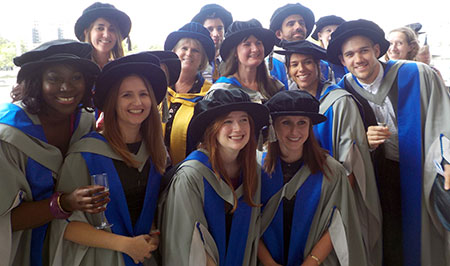
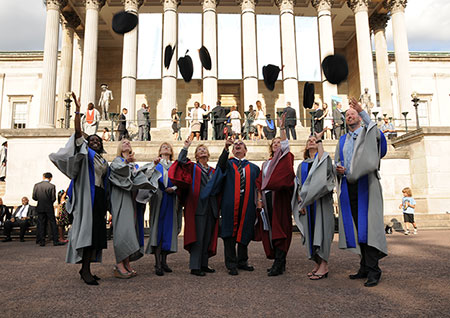
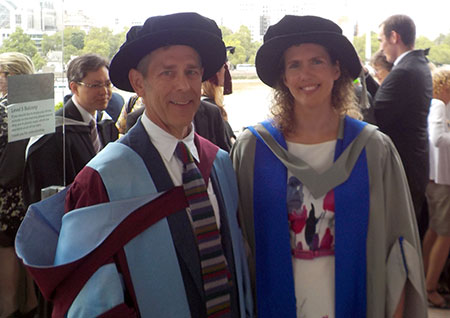
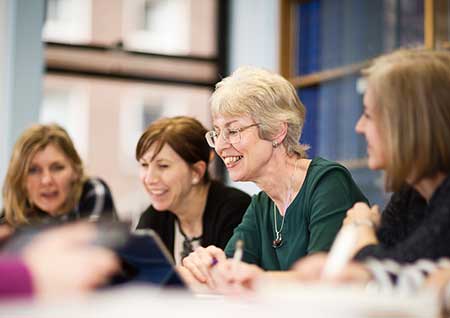
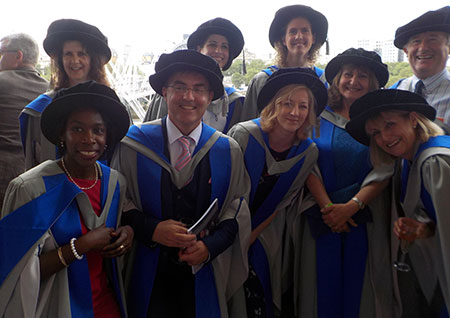

CPD Doctorate in Educational Psychology
After 24 years of making a significant contribution to professional development, the DEDPsy has accepted it's last recruits for January 2023 and so will be gradually winding down.
The DEdPsy is a flexible 4-year research degree (minimum) tailored to meet the needs of HCPC registered, practising educational psychologists with at least one year's experience. We welcomed our twenty-fifth cohort in January 2023. The course combines a practical/applied focus with academic and research excellence, providing opportunities to carry out high-quality, applied research into important and complex issues in the range of contexts in which EPs work.
Advantages of the programme cited by previous course members include:
- The opportunity to develop up-to-date applied research knowledge and to reflect on practice
- The programme's professional relevance
- The high quality of tutor support, expertise and of feedback offered
- Highly Skilled, knowledgeable and supportive group administrators
- The flexibility and diversity of the programme
- Opportunities to network with others from different organizations
- Participation in Leading Edge Day conferences, led by expert researchers and innovative EP practitioners
- Curriculum Content and the Timetable for Attendance
-
Curriculum Content
The following curriculum objectives form the cornerstones of the taught components of the programme and of each participant's learning and research plan. Each plan is tailored to individual and professional needs as well as UCL requirements.
(a) Applied research
- to acquire applied research skills which foster the development of insight, knowledge, understanding and expertise in a Local Authority or other educational psychology practice context
- to develop the skills to critically appraise and synthesise literature relevant to topics within educational psychology
- to develop a critical appreciation of the epistemological assumptions underlying a range of quantitative and qualitative research methods
- to develop an understanding of a range of both quantitative and qualitative research methods
- to develop mastery of methods employed in a personal research project which may involve either quantitative or qualitative methods or a combination of both
- to have opportunities to extend professional understanding and practice in relation to research ethics
(b) Professional practice
- to engage with leading-edge research and theory in educational psychology
- to consider how to adapt this knowledge to manage problems faced by educational psychologists in everyday professional practice
- to critically evaluate and extend/develop such aspects of professional practice
- to become a reflective and ethically sensitive practitioner
The psychology of adult learning and the provision of effective learning experiences for experienced professionals are particular areas of expertise at UCL. Learning activities build on and utilise participants’ prior knowledge of psychology and professional experience in educational psychology. The curriculum is delivered through:
- A carefully planned balance of in-person taught sessions at UCL and opportunities for accessible online tutorials and group problem-solving sessions.
- Access to UCL’s excellent web-based learning environment (Moodle), including our innovative research methods course
- Regular 1:1 tutorials with a personal tutor, alongside additional access to support and advice about more specialist research methodologies from other tutors within the team
- Regular group opportunities to discuss and share your developing individualized research plan with a supportive group of peers, and tutors
- Annual progress review meetings with your tutor and research advisor, providing additional advice and support as required
- Leading Edge Psychology Days and Workshops which include nationally known keynote speakers as well as practice components. The days focus on topical areas chosen by course members
Timetable Overview
Regular in person-taught sessions are provided at UCL, as well as days which offer online opportunities for tutorials and group discussion-based sessions. Given that course members are busy, practising educational psychologists, we believe that this approach offers a balance between the benefits of being part of a group and the accessibility of online support.
In year 1 there are 20 in-person days at UCL and 8 online days; in year 2 there are 5 in-person days at UCL and 6 online days; in year 3, there are 5 days at UCL and 6 days online and in year 4, there are 2 days at UCL and 7 days online. Click here to download the DEdPsy 2022 timetableThe DEdPsy at UCL is an intensive programme. In addition to attending timetabled days over the course of the four years, participants will need to commit up to 5 hours each week of term time to work on their doctorate studies. Further time will need to be allocated for data collection and other work-place based research activities. The programme facilitates private study by offering flexible off-site tutor support, access to excellent and diverse libraries and research materials and electronic learning modules. It should be noted that the four years is a minimum period of registration. It is not unusual for course members to need an additional year or two to complete the programme.
- Research and Assignment Components
-
The assessment requirements for the four-year DEdPsy programme for practising Educational Psychologists are:
- A research thesis of 30-40,000 words in length which makes a distinct contribution to knowledge of the subject and offers evidence of originality shown by the discovery of new facts and the exercise of independent critical power.
- Four professional assignments of 7,000 words each, which offer course members the chance to illuminate, develop and evaluate aspects of current or future practice in Educational Psychology. Assignments must relate to each of one of the following core topics in applied psychology:
- Psychological Assessment and Intervention
- The Profession of Educational and Child Psychology and its Context
- Personal Effectiveness in a Professional Context
- Equality, Diversity and Inclusion
Practising Educational Psychologists on the programme have based their assignments and theses on a wide range of topics, many of which are at the cutting edge of EP practice. Click here to view a full list of research thesis and assignment topics.
- Tutor Team
-
Our team of highly experienced and committed tutors includes:
- Dr Susan Birch (Senior Educational Psychologist, Hampshire and Isle of Wight Educational Psychology)
- Dr Phil Stringer (Previously Area Senior Educational Psychologist and former PEP, Hampshire and Isle of Wight Educational Psychology)
- Dr Gavin Morgan (Senior Educational Psychologist, North Northamptonshire)
- Dr Ben Hayes (Senior Educational Psychologist, Kent)
- Prof Ravi Das (Lecturer in Research Methods and Statistics)
- Testimonials
-
Each year we conduct a comprehensive evaluation of the programme, which provides useful feedback that we incorporate into the organisation and delivery of the programme. Recent evaluations have highlighted high levels of satisfaction expressed by the majority of current course members. Positives of the programme cited by previous course members include:
“The teaching team are undoubtedly the most significant asset. There is always someone available to offer insight and expertise. The teaching sessions are interesting, engaging and highly relevant with use of current studies and papers. All materials and supplementary reading material is well managed and easily accessed on Moodle. The UCL library is also an incredible resource.”
“Has relevance to my ongoing practice. Flexibility to choose what topics to research”
“Blended approach of online learning and face to face. Support of other course members who are in a similar position…juggling a number of competing demands on one's time”.
“Quality of latest research, materials and the leading edge day and annual conference”.
“It’s beautifully designed and organised. an excellent group of tutors - supportive and helpful. the admin team throughout have been fantastic. I would warn them that its a lot of work and the expectations are (rightly) high”.
“Brilliant for sharpening the mind and getting your research and academic skills updated”.
“Excellent teaching and learning experiences that will challenge and extend your existing skills and knowledge. Membership and peer support from your cohort of psychologists working in different roles. Dedicated time for critical reflection and consideration of professional practice”.
“I have changed as an EP. I have more breadth and confidence. I have made friends and worked with lovely colleagues”.
- Leading Edge Psychology Days
-
A particular benefit of the programme is the opportunity to attend our Leading Edge Psychology Days, mini conferences and workshops.
Whilst our workshops and mini conferences are exclusively for course members, our annual Leading Edge Psychology Days are also open to EPs and TEPs from across the country, therefore providing excellent networking opportunities. The structure of the day is well-established and involves both research and practice components of selected topics which are delivered by established researchers and innovative EP practitioners. Please click here to read about our forthcoming and recently held Leading Edge Psychology Days.
- Graduate and Tutor Research at UCL
-
For research by our graduates and tutors - including alumni publications and research symposia - click here.
- Graduate Study at UCL
-
University College London (UCL) is one of the foremost teaching and research institutions in the United Kingdom. It was founded in 1826 to provide higher education for all who could benefit from it, regardless of religion, race or class, and is both the longest established and largest of the various colleges and institutes that make up the University of London. The College was the first to admit women to higher education on equal terms with men, and also pioneered the teaching of many subjects at university level, including psychology.
Over half of the diverse 38,000 strong student community is engaged in graduate studies, with almost half of these pursuing research degrees. We have hundreds of collaborative research partners and an ever-expanding worldwide network of more than 200,000 UCL alumni helps to maintain the university's international reputation for innovation and excellence.
UCL is proud of its record of academic distinction. It can count 29 Nobel Prize winners among former academic staff and students, and our academic community includes 35 Fellows of the Royal Society, 11 of the Royal Academy of Engineering and 22 of the British Academy. UCL has the highest number of professors of any university in the UK, 975, as well as the highest number of female professors.
Ideally situated in the heart of Bloomsbury, central London's huge array of libraries, museums, public gardens, cinemas, theatres, cafés, bars and restaurants are all within easy reach. The UCL campus provides graduate students with many useful amenities, including a university bookshop; a language centre offering numerous evening courses; a multi million pound fitness suite; UCL's very own West End Theatre, the Bloomsbury; numerous fine and diverse museums and collections and extensive well resourced library facilities cited by many current DEdPsy course members as a particular asset to research.
To read more about the our history of Educational Psychology training and our place within the Department of Clinical Educational and Health Psychology, part of the Division of Psychology and Language Sciences, click here.
- Application Process
-
As stated above, the DEdPsy programme at UCL will no longer be recruiting.
Essential application requirements
- A British Psychological Society recognised Master’s (or equivalent level) qualification in educational psychology.
- Two references supporting the candidate’s ability to undertake the DEdPsy. The opinion and support of current employers should be sought. For applicants currently employed by local authorities or equivalent organisations, one of the two referees should be the head of service in which the applicant is working. (Please note that references should be emailed by referees directly to edadmin@ucl.ac.uk.
- An Initial Research Proposal which identifies a provisional topic for the thesis. This should be approximately one side of A4 and should outline an appropriate proposal for an area for research which should:
- identify a relevant question arising from research or practice
- explain why this might be an important focus for research within educational psychology and why this area is of particular interest to you as a practicing educational psychologist
- explore possible ideas for how research in this area might be carried out, in light of any reading completed, referring to any possibilities and/or challenges already identified
Desirable
- Evidence of keeping up-to-date with developments in psychology
- Evidence of an understanding of current issues in educational psychology
- Evidence of innovatory/creative work in your own professional practice
- Evidence of recent involvement in applied small-scale action research carried out within your own practice context
- Evidence of published paper(s) in professional journal(s) and/or conference presentations
- Evidence of the ability to write logically and clearly
- Fees
-
Fees for the DEdPsy, commencing in January 2023, are estimated to be:
- UK students: £2,950
- Overseas students: approximately £13,230
Study is available on a part-time basis only. Fees are payable for each year of formal registration.
Interested applicants are strongly encouraged to seek support from their employer (including support with payment of programme fees). Where an applicant's employer contributes financial support, an annual report on the applicant's progress will be made to the employer if requested. This report is open to the applicant.
- Frequently Asked Questions
-
AAnswers to a number of queries we have received from past DEdPsy applicants are provided below. You can also download all our FAQs as a pdf file here:
What kind of applicant are UCL looking for?
We are interested in supporting any qualified and practising educational psychologist who is committed to developing their research skills through the programme, who meets our application criteria and who shows the ability in interview to be able to engage with a relevant and important topic in educational psychology through critical thinking related to their reading.
There is no age restriction – we have course members who are in their second year of professional practice and we have supported course members who are nearing retirement and who see completing the Doctorate as the pinnacle of their career.
Our course members work in a variety of contexts: in local authority services across a wide geographical range, in independent practice as sole practitioners, as well as psychologists working for private or other organisations. We also support course members who work in clinical settings, e.g. those who are also qualified as neuropsychologists working in hospital settings or working within multidisciplinary and clinic settings (in Ireland and further afield).
You do not need to have completed your MSc or undergraduate degree at a particular university, or to only be interested in carrying out a particular type of research or work on a particular topic. What is key for us at UCL is that through the course, you are able to identify a research question and a relevant methodology to address that question in a rigorous, critical and creative way.
Why should I choose this course and not a PhD?
Our professional doctorate programme is carefully designed and structured to facilitate exploration of questions and issues from everyday practice through the development of research skills. You will have the opportunity to carry out a focused piece of research culminating in a 40,000 word research thesis, as well as four professional practice assignments which will relate to a range of topics relevant to professional practice. The course is therefore structured around these two main curricular elements - the first focuses on research methods and the second on reflections around professional issues. Practically, the structure of the course is also designed to enable course members to work whilst they are studying.
You therefore have the opportunity to explore a wider range of topics than you would on a traditional PhD, to work as part of a supportive group of peers, and to have access to a carefully structured taught programme with regular timetabled opportunities for supervision.
On the DEdPsy, you will not have a supervisor who is necessarily a specialist or expert in your particular topic area as you would studying for a PhD. However, you will have access to support from a wider tutor team with a breadth of knowledge and experience (alongside years of experience in supporting practising EPs to complete professional doctorates). This includes support from your professional tutor and from a Research Adviser.
I haven’t studied for many years – what support is there to help me?
Our tutor team has a wealth of experience in supporting course members who have not studied for some time and we understand the anxiety that this can bring, particularly in relation to academic writing, statistics and the use of technology to support research. Our curriculum is designed to offer introductory sessions followed by opportunities to seek further advice from tutors or to revisit topics in taught sessions. We are also open to exploring the possibility of providing additional workshops or support where a need is identified.
Academic writing, for example, is introduced in a session in the first few days of the course. Later sessions, still within the first few months of the course, focus on reference management, systematic literature reviews and on literature searching. Additional opportunities for support are available through parallel sessions (available whilst tutorials are held) and a half day workshop on literature review methods. You will receive detailed feedback on a first draft of your first assignment in May, before you submit a second version in August, again for detailed feedback in September before preparing a final version for examination in November. By the time you write your thesis, you will have received feedback and support with your academic writing skills on many occasions through work towards your assignments and developing a literature review for your thesis.
I’m worried about statistics as I’ve always found this hard – how is this taught on the course?
The teaching of statistics and research methods on the course has been carefully designed and has been described by course members as ‘brilliant’. Our research methods tutor has a good understanding of the needs of our course members and has a relaxed and informal approach. Real life examples are used from EP practice wherever possible as a basis for teaching and there are lots of opportunities for hands-on, practical work around real data.
Who would my tutor be?
There are four professional tutors who work with new course members – Dr Susan Birch, Dr Phil Stringer,Dr Gavin Morganand, Dr Ben Hayes . You will be assigned a professional tutor for the four years of the programme.
What happens if I miss a day?
If you are unable to attend we ask that you notify your tutor and the office. All session handouts are available on our Virtual Learning Environment (Moodle) and many taught sessions are recorded. You are also welcome to follow-up with the tutor leading a missed session with any questions that you have. Individual tutorials can be rearranged and held on Zoom or on MS Teams if you are unable to come into college.
What is it like studying on the programme as an overseas student?
Over the years we have had a small number of students based around the world (e.g. Singapore, the U.S, Dubai and France). However, UCL does not currently support part-time study for students on a Tier 4 visa. International students therefore need to seek advice from the UCL Immigration and Visas Team about whether they might be able to access the programme.Click here to view UCL's Immigration and Visa advice for overseas students. I am an educational psychologist based in Ireland. Do I need a visa post Brexit?
Click here to view UCL's Immigration and Visa advice for Irish citizens
The ULC website states the following: “The Common Travel Area (CTA) is a long-standing arrangement between the UK, the Crown Dependencies and Ireland. The CTA established cooperation between respective immigration authorities enabling British and Irish citizens to move freely between, and reside in, these islands. British and Irish citizens enjoy additional rights in Ireland and the UK. These include the right to work, study and vote in certain elections, as well as to access social welfare benefits and health services. If you are a British citizen or an Irish citizen you do not need to take any action to protect your status and rights associated with the CTA. After the UK leaves the EU, you will continue to enjoy these rights, no matter what the terms of the UK’s exit. Both the UK and Irish governments have committed to taking all necessary measures to ensure that the agreed CTA rights and privileges are protected in all outcomes.” What support is available for students experiencing difficulties?
The professional tutor is the main support for course members, although course members are also welcome to speak to either of the course co-Directors if they feel that would be helpful. Tutors may signpost individual course members to UCL Doctoral School short courses where further support with learning or research skills is needed or to UCL’s support services (e.g. the student psychological services or student disability services) if personal support or adjustments to the learning environment are needed.
I started a CPD Doctorate in educational psychology at another university – is there any way my prior work can be accredited towards the DEdPsy?
No, UCL does not have a route for the accreditation of prior learning. You will need to fulfil all of the requirements laid out for the DEdPsy.
What happens if something arises which means I can’t study during the course (e.g. pregnancy, adoption, illness, illness of a relative)
We will work flexibly with you to support you to make decisions regarding your ability to study. Where a difficulty is relatively short-lived, we will be happy to explore 'in course' options with you, extending deadlines for the submission of work.
UCL also enables all students to interrupt their studies if needed, up to a maximum of two years and fees are held over until the student then returns. Due to the demands of juggling study with work and complex life contexts, we generally have a small number of course members interrupting their studies at any one time. When course members return, they may re-join their original course group or can explore joining another year group. We encourage course members to join any teaching sessions of other year groups that they may have missed.
If I am unable to complete the course, is there a step-off award such as an MPhil?
No, unfortunately this is not offered at UCL.
How long does it take most students to complete the course?
The minimum length of the course is four years (with a viva in February of the fifth year and then time needed to complete any outstanding corrections). It is quite common for our course members to need longer than the minimum period and a significant proportion will take 5-6 years to complete. The length of time you will need does depend on your working style/speed and familiarity with the requirements of an academic course, the time you are able to make available for work on the programme, the time needed for your particular research project (e.g. the design of the research project, time needed to access participants and obtain consent in a timely manner), alongside ‘real life’ situations that may arise, e.g. pregnancy, illness, house moves, changes in professional role and employment situation etc.
Who can I talk to if I want to find out more about the programme?
You can talk to our Programme Directors – Dr Susan Birch (s.birch@ucl.ac.uk) and Dr Phil Stringer (p.stringer@ucl.ac.uk). Email them to arrange a mutually convenient date for a telephone or online discussion. Alternatively you can attend a Leading Edge day or speak to a colleague who has completed the programme.
When submitting an account of a possible area of interest for my research as part of my application, what level of detail do I need to include?
The draft ‘research proposal’ should be approximately one side of A4. You need to outline an appropriate proposal for an area for research:- identifying an appropriate and relevant question arising from research or practice
- describing the basis of your personal interest in the topic
- explaining why this might be an important focus for research within educational psychology
- exploring possible ideas for how research in this area might be carried out, in light of any reading completed, referring to any possibilities and/or challenges already identified
How many places are there on the course each year?
There are usually 12 places per year. We do hold a reserve list and offer places for the following year to those who apply after the 12 places have been filled and to those who apply after the formal application deadline. A small number of applicants on the reserve list may be offered a place on the course if a place becomes available.
Is there a reading list for the course?
Click here for a list of suggestions for preliminary reading which you may find helpful to consider before starting the course. Refreshing your understanding around research principles and design is likely to be helpful, as well as following up reading around your particular area of interest.
- Contact
-
Potential applicants are welcome to contact the Programme Directors, Dr Susan Birch and Dr Phil Stringer, to arrange an information telephone discussion about the programme and interview procedure.
You can also contact our admin team with general queries:
Tel: 020 7679 5307
email: edadmin@ucl.ac.uk
Download our programme brochure
Student Experience
Hear a recent DEdPsy graduate speak about her experiences on the programme:
Listen to 5 current DEdPsy course members talk about their experiences on the programme, their professional backgrounds and some possible misconceptions about the DEdPsy:
Dr Phil Stringer, DEdPsy Programme Co-Director, talks about the DEdPsy:
 Close
Close


